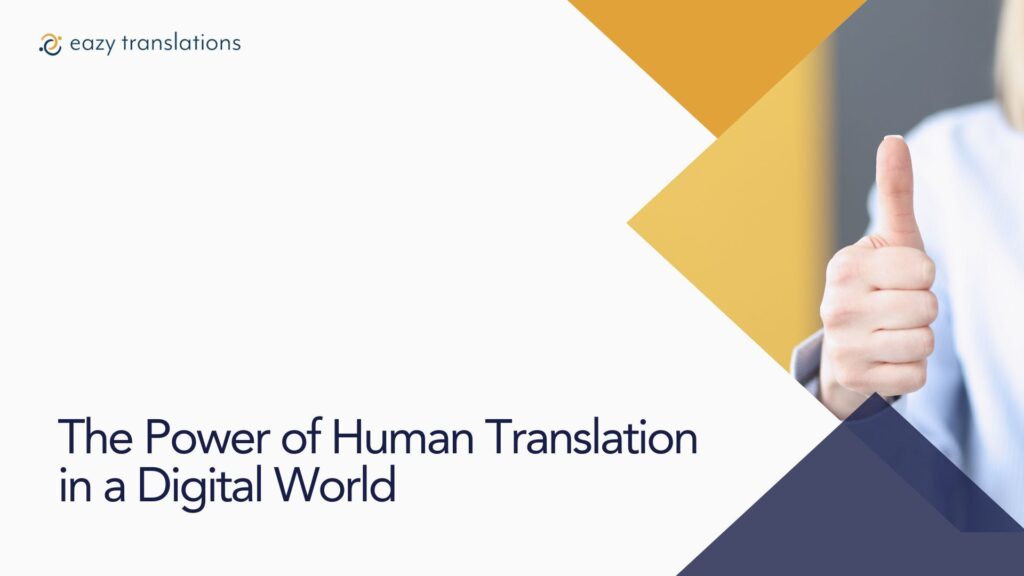
Contents
In a world where AI and technology is constantly evolving, the power of human translation remains irreplaceable. While machine translation has made significant advancements in recent years, it still falls short when compared to the accuracy, nuance, and cultural understanding that can only be provided by a human translator.
Understanding the limitations of machine translation is crucial in recognizing the value of human translation, especially in a world increasingly reliant on digital solutions.
One of the most significant limitations of machine translation is its inability to fully understand context. Machines translate text based on algorithms and pre-programmed rules, which means they often miss the nuances and subtleties inherent in human languages. For instance, a machine might struggle to accurately translate idioms, metaphors, or expressions that don’t have direct equivalents in other languages. This lack of contextual understanding can lead to translations that are technically correct but culturally or situationaly inappropriate.
Different languages have unique syntactic structures and grammatical rules. Machine translation tools, despite their advancements, often struggle with complex sentence structures, leading to grammatically incorrect or awkward translations. This is particularly evident in languages that have a flexible word order or rely heavily on inflectional forms, like Russian or Finnish for example.
The tone and style of a piece of writing are just as important as its content, especially in marketing, literature, or persuasive writing. Machine translations typically fail to capture the author’s tone, which can range from formal and professional to casual and colloquial. This can result in a translated text that feels stiff, unnatural, or out of place.
Languages are deeply intertwined with culture, and certain phrases or concepts might not have direct counterparts in other cultures. Machine translation systems are not yet adept at handling these cultural nuances, which can lead to misunderstandings or even offense. For example, a direct translation of a marketing slogan might miss cultural sensitivities or local humor, making it less effective or even inappropriate in the target culture.
In fields like law, medicine, or technology, precision and accuracy are paramount. Machine translations often lack the domain-specific knowledge required to accurately translate technical or specialised content. Misinterpretations in these fields can have serious consequences, making reliance on machine translation risky.
Machine translation services often require data to be sent to external servers, raising concerns about data privacy and confidentiality. This is a significant issue for businesses or individuals dealing with sensitive information.
While machine translation has made significant strides and is a valuable tool for quick, rough translations, it has inherent limitations in understanding context, complex syntax, tone, style, and cultural nuances. These limitations underscore the importance of human translation, especially in scenarios where accuracy, cultural sensitivity, and nuanced understanding are crucial.
The power of human translation lies in its ability to bridge linguistic and cultural divides with a level of nuance, understanding, and adaptability that machine translation cannot yet match. Human translators bring a depth of linguistic and cultural knowledge, emotional intelligence, and contextual awareness to their work, making them indispensable in many scenarios.
Let’s look at how human translators make a key difference.
Human translators excel at understanding the nuances and subtleties of language. They can interpret idiomatic expressions, regional sayings, and cultural references, making sure that the translation is not only linguistically accurate but also culturally appropriate. This is particularly important in literary works, marketing materials, and any content where emotional and cultural resonance is key.
Humans can adjust their translations based on the context and purpose of the document. Whether it’s a legal contract requiring precision or a novel needing a creative touch, human translators can tailor their approach to suit the specific needs of the text.
Human translators are adept at capturing and replicating the tone and style of the original text. This ability is crucial in maintaining the author’s voice in literary translations or the persuasive power in advertising copy. They can interpret and convey humor, sarcasm, and emotion, which are often lost in machine translation.
Translation often involves creative problem-solving, especially when dealing with phrases or concepts that don’t have direct equivalents in the target language. Human translators can find innovative ways to convey the same meaning or emotion, preserving the integrity of the original message.
In fields like law, medicine, or technology, translators not only translate the language but also understand the specialized terminology and concepts. This expertise ensures that translations in these fields are accurate and reliable.
Unlike machine translation, professional human translators adhere to ethical standards, including confidentiality. This is crucial for sensitive or proprietary information.
Human translators play a vital role in building understanding and connections across cultures. They help businesses expand into new markets, aid in diplomatic communication, and allow for the sharing of ideas and knowledge across language barriers.
Languages are constantly evolving, and human translators keep up with these changes, including new slang, terminologies, and usage patterns. This adaptability is something that machine translation systems can struggle to keep pace with.
In summary, the power of human translation lies in its ability to provide accurate, culturally sensitive, and contextually appropriate translations. Human translators bring empathy, creativity, and specialised knowledge to their work, making them an invaluable asset in a world where effective and nuanced communication is key.